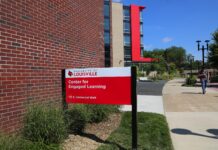
What happens if a researcher wants to use stored blood or a tissue sample from a patient who received assurances and only gave permission to their personal doctor years ago? Does the researcher have an obligation to notify the patient that their blood or tissue is going to be used in a study? Should they be required to get another, separate consent form from that patient?
These are some of the difficult ethical questions the University of Louisville’s Dr. Kyle Brothers will be tackling with a 4-year, $1.7 million grant from the National Institutes of Health and its National Human Genome Research Institute. It is a clash of personal privacy concerns with the need to broaden and share the tools of research – a bioethical dilemma.
“We’re looking at the commitments researchers have made to participants and communities, and how they can keep those commitments when they share this information with others,” Brothers says.
Brothers is teaming up with researchers at Case Western Reserve University to take a look at networks of biorepositories across the United States. Biorepositories are the storage freezers at universities and hospitals where blood, tissue and other human specimens are stored, as well as data about the donors of these samples. Brothers’ research will focus on what policies should be in place when samples and data are shared across networks of multiple biorepositories working together.
As his research moves along, Brothers plans to hold a meeting in Washington, D.C., with important stakeholders in U.S. biorepositories, offering them guidance on data access, governance and ethical obligations to those whose specimens they have in storage.
“We’re going to be helping set best practices for biorepositories across the country,” Brothers says.




























